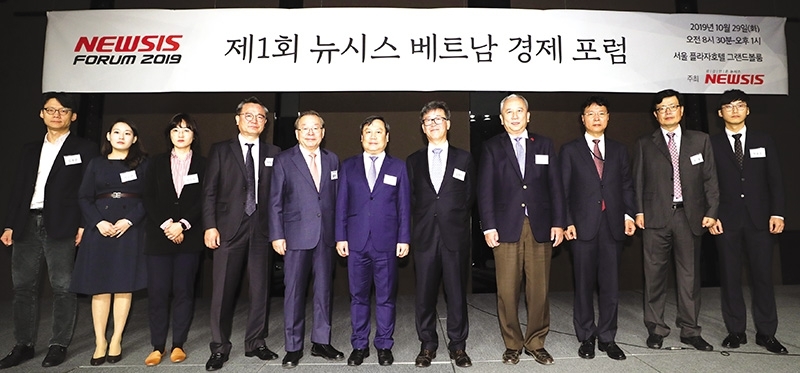
After a year of operations at a $200 million factory in Hanoi’s Hoa Lac Hi-Tech Park to produce airplane engine parts and components, world-leading tech and energy group Hanwha Aero Engines is planning to expand, raising total investment to $260 million by 2021.
The facility, the first foreign-invested project of its kind in the Vietnamese aviation industry, targets leading brands such as General Electric, Pratt & Whitney, and Rolls-Royce.
Hanwha Aero Engines, a subsidiary of conglomerate Hanwha Group, is among the South Korean investors trending towards Vietnam in order to ease risks from China.
The Vietnam Economic Forum, held in Seoul last week, was prime evidence of this, with the attendance of 400 businesses and delegates across different economic sectors including Samsung, LG, Lotte, SK, Posco, CJ, and LG Chemical. They shared their future business plans in Vietnam when meeting with Vietnamese Deputy Minister of Planning and Investment Vu Dai Thang.
A representative of LG Chemical said that the group is keen on developing a Li-ion battery initiative in Vietnam, after establishing a joint venture with VinFast on battery assembly, a unit of Vietnam’s leading private conglomerate Vingroup. “Though it is scheduled to be carried out a little bit later than the plan due to market conditions, we are working to proceed it,” the representative said.
Meanwhile, the Korea Agriculture Machinery Industry Cooperative is eyeing an agriculture machinery manufacturing project to cash in on growing demand.
Deputy Minister Thang emphasized that, “South Korea is Vietnam’s one of leading strategic partners in our economic restructuring towards focusing more on innovation, development of an intellectual-based economy, increasing growth quality, and national competitiveness. The Vietnamese market has enough potential for successful business plans among South Korean investors, especially in the context of beloved South Korean brands.”
“In our new foreign direct investment attraction strategy, Vietnam will prioritize the quality of FDI, environmental protection, advanced and new technology, and investments with high added value and big influence on others, helping connect with the global supply and value chains,” he continued.
“South Korean investment in the processing and manufacturing, supporting industries, new materials, high-tech agriculture, ICT, energy, infrastructure development, smart urban areas, healthcare and high-quality services will be encouraged.”
The deputy minister added that he has seen special interest among South Korean investors in Vietnam in recent years, with many seeking co-operation to supply and develop spare parts for locally-branded automobiles. “This is very different from five years ago,” he said.
In notable cases, KEB Hana Bank has spent over $800 million acquiring 15 per cent of stake in BIDV, while SK bought a 6 per cent stake of Vingroup for $1 billion.
In the past, investment from South Korea concentrated on light industries, textiles and garments, and footwear, as well as outsourcing for exports. Nowadays, however, it goes mostly into high-tech industries such as electronic spare part manufacturing.
The trend has now intensified through Vietnam’s new FDI attraction strategy, and President Moon Jae-in’s New Southern Policy, in which Vietnam is among the business and investment targets in the ASEAN. The policy is the South Korean government’s prioritized foreign and economic policy, aiming to strengthen trade and investment ties with the bloc and ease reliance on China and the United States amid escalating trade tensions between the two global leading economies.
Jae-Young Lee, president of the Korea Institute for International Economic Policy stated, “Moon Jae-in’s administration has announced various policy measures to promote investment within Vietnam, such as expanding the size of the Global Infrastructure Fund, the ASEAN-South Korea Cooperation Fund, and the Korea-Mekong Cooperation Fund.”
According to Lee, in the past, businesses had to seek opportunities in southern markets themselves, but now the South Korean government will build a network to connect them with target markets by organizing trips and meetings with potential partners and local agencies.
“The government will also work directly with the governments of Vietnam and across the ASEAN on measures and to deal with all possible business barriers,” Lee said.
A recent mission by South Korea’s Ministry of Foreign Affairs met with Deputy Minister Thang in Hanoi. They discussed solutions to deal with current bottlenecks facing South Korean investment in banking and finance, infrastructure and energy, industry and sci-tech, IT and telecoms, and labor and healthcare sectors. It aims to clear the path for new South Korean investment in Vietnam in the future.
As of late October, South Korea was Vietnam’s biggest foreign investor with the accumulated total registered capital of $66.6 billion. In the first 10 months of 2019, South Korea’s total pledged capital reached $5.5 billion.


















